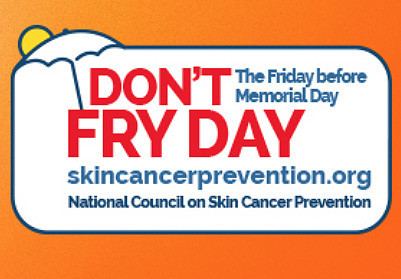The Friday before Memorial Day has been designated as Don’t Fry Day, reminding people to protect their skin to decrease their risk of skin cancer as summer vacations get underway and warm weather outdoor activities gear up.
Skin cancer is by far the most common type of cancer in the United States. Estimates suggest that more than 3 million people will be diagnosed with skin cancer this year, and about one in five Americans will develop skin cancer over their lifetime, according to the American Cancer Society.
The most common type of skin cancer, basal cell skin cancer, can usually be successfully treated. Melanoma is less common but more deadly. It can spread throughout the body and causes nearly 10,000 deaths annually.
The primary risk factor for skin cancer is exposure to ultraviolet (UV) radiation from the sun or from tanning beds. People who spend a lot of time outdoors and those with pale skin that sunburns easily are at greatest risk. But people with dark skin can also develop skin cancer.

Courtesy of National Council on Skin Cancer Prevention
Spearheaded by the National Council on Skin Care Prevention, Don’t Fry Day aims to raise sun safety awareness and encourage people to take steps to avoid damaging sun exposure:
- Wear protective clothing such as a long-sleeved shirt and wide-brimmed hat.
- Wear sunglasses to protect your eyes.
- Seek shade, especially when the sun’s rays are strongest between 10:00 a.m. and 4:00 p.m.
- Be extra cautious near reflective sand, water or snow.
- Use a broad-spectrum sunscreen that protects against UVA and UVB rays.
- Use a strong enough sunscreen and reapply every two hours and after swimming.
- Avoid sun tanning and using tanning beds.
This week the Food and Drug Administration announced new actions to crack down on companies that illegally market dietary supplements that make unproven claims about protecting people from the sun.
These companies “are putting people’s health at risk by giving consumers a false sense of security that a dietary supplement could prevent sunburn, reduce early skin aging caused by the sun, or protect from the risks of skin cancer,” said FDA commissioner Scott Gottlieb, MD. “There’s no pill or capsule that can replace your sunscreen.”
See Cancer Health’s Basics on skin cancer and melanoma.
Click here for information and resources on the Don’t Fry Day website.
Click here for Don’t Fry Day and skin cancer coverage from the American Cancer Society.







Comments
Comments